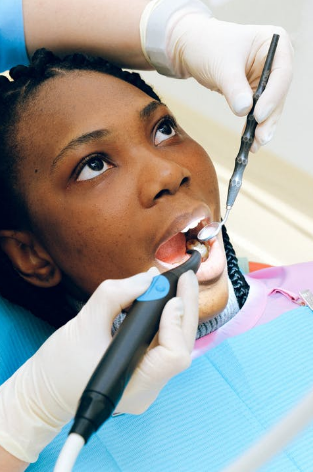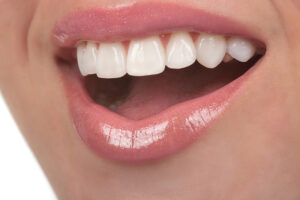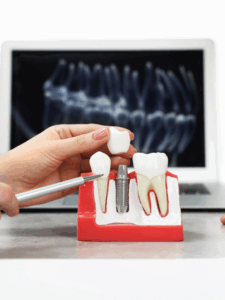LASER stands for Light Amplification by the Stimulated Emission of Radiation. Laser dentistry is used for many surgeries as any laser instrument emits light energy in a focused beam, closely tackling the problem on a narrow scale and ensuring no other surrounding oral or facial areas are damaged.
Since its first application in the dental industry in the 1960s, laser applications have come a long way. They are used to treat hard and soft tissue in patients suffering from oral issues. After extensive research on laser explosions, especially during the past few years, lasers now help with caries treatment, cavity preparation, bleaching, and many other restorative processes.
Under soft tissue treatments, laser technology helps with wound healing, removing hyperplasic tissue, uncovering impacted or partial tooth eruption, and other such surgeries. With laser technology, dentists and dental care specialists have provided much less invasive surgeries for both simple and complex processes.
Laser surgeries are much more efficient, more cost-effective, and cause less discomfort. The Food And Drug Administration (FDA) has authorized laser products and treatment for several dental care procedures.
Keep reading to learn more about how dentists use laser technology to treat multiple oral and dental diseases in their patients.
Types Of Laser Dentistry
Laser dentistry has massively improved the way surgeries are performed. Many complex procedures can now be performed in non-invasive manners so that healing time is reduced. There are two main types of laser treatments:
1. Soft Tissue Treatment
Laser Gum Reshaping
Misshaped gums result from either genetic reasons or bad dental hygiene. Poor lifestyle choices such as drug and alcohol abuse also affect the shape of your gums and teeth. This could lead to tooth sensitivity or a potential cosmetic issue.
With lasers, a gum reshaping procedure means less bleeding and inflammation during and after surgery.
Tongue Frenulum Attachment
A frenulum attachment of the tongue to the floor of the mouth makes speech difficult for people born with the condition. This condition may be hereditary.
Simple laser treatment can help patients with this slight issue, causing a significant improvement in speech impediment problems.
2. Hard Tissue Procedures
Cavity Filling
A dental laser procedure can help dentists fight the cavity by killing the bacteria in it. This simple process needs no tooth deconstruction and helps patients retain their original teeth.
Instead of using a drill to drill through a perfectly healthy tooth otherwise, dentists can use a narrow light beam to target the bacteria in the decayed area. A laser dental filling is a non-invasive alternative for cavity-filling surgery.
Cavity Detection
Tooth decay quickly destroys the tooth. A cavity detection with lasers helps identify and tackle the problem much earlier. With laser treatment, dentists and patients can now take preventive measures to preserve as much of the tooth as possible.
Sensitivity Treatment
A toothache caused by something being too hot or cold is called tooth sensitivity. Laser dentistry helps treat tooth sensitivity in patients by blocking narrow tubes in the root that signal the nerve, causing a painful sensation. Blocking these nerves and signals means no more sensitivity to cold or hot food items.
Laser treatments largely vary in price depending on the procedure and the equipment used. Some laser treatments might seem more expensive, but technically, they help you save on healing time as the same procedure is completed in much fewer sessions.
Let’s find out some more benefits of using laser treatments.
Benefits of Laser Treatments
- Laser treatment promotes blood clotting. Using laser technology to treat soft tissue is minimally invasive and reduces bleeding during the process.
- Wounds heal fasterafter laser treatments as tissue regenerates only in the focused treatment area.
- Laser beams reduce the need for sutures in soft tissue that can be painful and require extensive surgery.
- Some surgeries no longer require anesthesia because laser surgeries can tackle some problems with little or no pain.
- Laser treatment comparatively causes less harm to surrounding tissue.
- Laser beams are effective at killing bacteria and reactivating tissue growth.
- Soft tissue lasers block blood vessels and nerve endings during a procedure that involves tissue penetration.
Laser treatments are much quicker and safer for dental care experts and patients. While dentists can consult and treat more patients within a shorter span, patients go through less anxiety and pain during and after dental procedures.
Risks
The risks associated with laser dental treatment are potentially small. Most injuries or instances occur when the dental care expert is unaware of correct laser usage. However, the FDA advises dental care providers and clinics to carry out laser surgery training before performing any treatments.
Laser dentistry has been around for some time now. It has many benefits and potentially no risks if you reach out to the right care provider with experience and finesse in the industry.
West Hills Smiles in California has a team of experts who believe in quick, effective procedures for their patients. We use cutting-edge laser technology to help our dentists and oral care experts deal with surgeries and invasive procedures that are painless.
We provide general and Cosmetic Dental Services West Hills area and rank customer satisfaction as a top priority. Our clinic also provides Urgent Dental Care Near Me after regular business hours. You can learn more about our services and laser-assisted procedures before you reach out to us.
You can also find out more about our team and book an appointment for all your dental needs.








